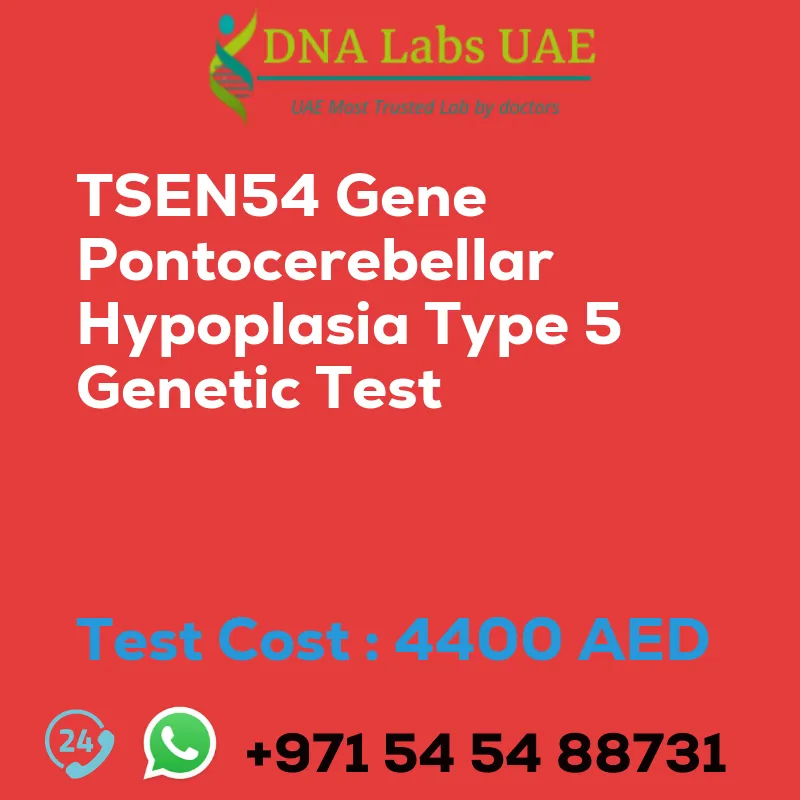TSEN54 Gene Pontocerebellar Hypoplasia Type 5 Genetic Test
Genetic testing plays a crucial role in diagnosing and understanding rare genetic disorders such as Pontocerebellar hypoplasia type 5 (PCH5). This blog post will provide detailed information about the TSEN54 Gene Pontocerebellar hypoplasia type 5 Genetic Test offered by DNA Labs UAE, including its cost, symptoms, diagnosis, and other relevant details.
Test Name: TSEN54 Gene Pontocerebellar Hypoplasia Type 5 Genetic Test
Components: Blood or Extracted DNA or One drop Blood on FTA Card
Price: 4400.0 AED
Sample Condition: Blood or Extracted DNA or One drop Blood on FTA Card
Report Delivery: 3 to 4 Weeks
Method: NGS Technology
Test Type: Neurological Disorders
Doctor: Neurologist
Test Department: Genetics
Pre Test Information
Prior to undergoing the TSEN54 Gene Pontocerebellar Hypoplasia Type 5 Genetic Test, it is important to provide the clinical history of the patient. Additionally, a genetic counseling session may be conducted to draw a pedigree chart of family members affected by TSEN54 Gene Pontocerebellar hypoplasia type 5.
Test Details
Pontocerebellar hypoplasia type 5 (PCH5) is a rare genetic disorder that affects the development of the brain, specifically the cerebellum and the pons. This disorder is caused by mutations in the TSEN54 gene. The TSEN54 gene provides instructions for making a protein that is part of a complex called the tRNA splicing endonuclease. This complex is involved in the processing of transfer RNA (tRNA), which plays a crucial role in protein synthesis.
NGS (Next-Generation Sequencing) genetic testing is a method used to analyze multiple genes simultaneously to identify mutations or variants associated with a particular condition. In the case of PCH5, NGS genetic testing can be used to detect mutations in the TSEN54 gene. By sequencing the TSEN54 gene, potential mutations or variants can be identified, aiding in the confirmation of a diagnosis for individuals exhibiting symptoms consistent with PCH5.
It is important to note that NGS genetic testing may not be available in all healthcare settings and may require specialized testing facilities. Additionally, genetic testing for PCH5 may not be covered by insurance and can be costly. Therefore, it is recommended to consult with a healthcare professional or a genetic counselor to determine the appropriateness and availability of NGS genetic testing for PCH5 in specific cases.
| Test Name | TSEN54 Gene Pontocerebellar hypoplasia type 5 Genetic Test |
|---|---|
| Components | |
| Price | 4400.0 AED |
| Sample Condition | Blood or Extracted DNA or One drop Blood on FTA Card o |
| Report Delivery | 3 to 4 Weeks |
| Method | NGS Technology |
| Test type | Neurological Disorders |
| Doctor | Neurologist |
| Test Department: | Genetics |
| Pre Test Information | Clinical History of Patient who is going for TSEN54 Gene Pontocerebellar hypoplasia type 5 NGS Genetic DNA Test A Genetic Counselling session to draw a pedigree chart of family members affected with TSEN54 Gene Pontocerebellar hypoplasia type 5 |
| Test Details |
Pontocerebellar hypoplasia type 5 (PCH5) is a rare genetic disorder that affects the development of the brain, specifically the cerebellum and the pons. It is caused by mutations in the TSEN54 gene. NGS (Next-Generation Sequencing) genetic testing is a method used to analyze multiple genes simultaneously to identify mutations or variants that may be associated with a particular condition. In the case of PCH5, NGS genetic testing can be used to detect mutations in the TSEN54 gene. The TSEN54 gene provides instructions for making a protein that is part of a complex called the tRNA splicing endonuclease. This complex is involved in the processing of transfer RNA (tRNA), which plays a crucial role in protein synthesis. Mutations in the TSEN54 gene can disrupt the normal function of the tRNA splicing endonuclease, leading to the characteristic features of PCH5. NGS genetic testing for PCH5 involves sequencing the TSEN54 gene to identify any potential mutations or variants. This can help confirm a diagnosis of PCH5 in individuals who exhibit symptoms consistent with the disorder. It is important to note that NGS genetic testing may not be available in all healthcare settings and may require specialized testing facilities. Additionally, genetic testing for PCH5 may not be covered by insurance and can be costly. Therefore, it is recommended to consult with a healthcare professional or a genetic counselor to determine the appropriateness and availability of NGS genetic testing for PCH5 in specific cases. |








